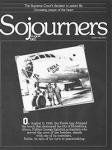The Discipline of the Mountain: Dante's Purgatorio in a Nuclear World. By Daniel Berrigan. Illustrations by Robert McGovern. Seabury Press, 1979.
Berrigan writes that he went to the Purgatorio in search of "ways of imagining our plight." Looking for new vision in an old work is a familiar activity; but when it means reforging that work to make a new vision, it becomes complicated for both writer and reader. Unlike translation, an "imitation" does not replace the original text. Instead it offers a new work through which the old text is still visible; to read it is to read two texts. Its author writes in the confidence, or hope, that the vision of the older text is still valid, assuming that for his readers as for himself the vision's fundamental values remain true and compelling.
But are we close enough to Dante to make this complicated process work? That depends on what we need from him. Berrigan needs terms in which to grasp the barrenness and violence of a way of life that constantly threatens war. Wanting Christian terms for this, terms powerful to Christian consciences, he naturally turns to Dante as the great poet of the Christian vision. And certainly Dante's world was no less violent than ours.
Nevertheless, on one crucial point Dante's vision is rejected. Dante believed in two authorities, two roads--the spiritual for spiritual affairs, the secular for secular. Berrigan cannot accept half, or more than half, of this faith. For him the imperium, the secular authority, has been irredeemably compromised; and the church suffers from the same corruption, insofar as it has allied itself with the state-at-war and attempts to guide it.
It would be hard not to agree with Berrigan about what the church, "humiliated, pruned," ought to have learned from its investment in the growth of modern war. But it is not true that the Divine Comedy arose from a parallel disenchantment in Dante. Whatever lessons exile taught him, it did not teach him that the secular authority was corrupt. His exile was made tolerable by his dream of the imperium as it should have been; not as it was, transcending his failure and that of Florence, and this dream sustained part of the Comedy's anger and hope.
Berrigan can transfer Dante's anger to our situation, with every justification. Sensing on one hand deliberate evil, and on the other a kind of stunned absence of moral awareness, he wishes for a Dante to prophesy, and the next best thing is to reawaken the Dante we have. But he cannot transfer Dante's political hope; the hope he takes from Dante must be moral.
This moral focus shapes the entire work. The book reaches a wide range of ethical and spiritual conditions, persistently explored in terms of the "plight" Berrigan is most conscious of, armament, preparation and eagerness for war, nuclear possibilities. Sins such as anger and greed, that seem to lead to social conditions that lead to war, make the redactor's way clear: The available power of Dante's vision has not diminished, and Berrigan draws out its capacity to shame and challenge us. With a sin such as envy the way is less clear, and. Berrigan confesses himself puzzled.
For an exploration of moral consciousness the choice of the Purgatorio was inevitable. The more familiar choice of hell as an image for catastrophe expresses the intensity of our lives, but it also expresses our wish to relax in despair. If earth is a hell, as Paul Blackburn wrote, then we do not have to find hope or remake ourselves in ways which could imply hope. Hell is irremediable.
But the Purgatorio's theme is moral critique regeneration. Since purgatory extends the sanctifying offered and rejected--or only partially received--on earth, there is no sharp division between our life and the condition of the blessed sufferers. In purgatory accepting guilt and pain means accepting grace and the hope of blessedness: "Welcome to dolor/to glory."
The moral focus has formal results as well. The work presents a redaction of Dante's poem, mostly but not solely in verse, and an exposition, mostly but not solely in prose. Between them much of Dante's narrative push is lost, because Berrigan must make explicit what Dante could leave embedded in the story: "The Terrace of Pride," "Images of the Carven Wall," labeled sections.
On the other hand, what Dante has to keep clear and distinct Berrigan can integrate, vary, and fuse. As Virgil to Dante, so Dante to Berrigan: but "Dante" brings with him the complex discourse and insight worked out in the Comedy between Dante and Virgil, so that Berrigan has two guides, Virgil and Dante; both Dante and Berrigan are pilgrims; and Berrigan is included along with Dante in those crucial moments when Dante joins the penitents in their purgative suffering. "He spoke or I spoke/or both"--the voice is not definite, and does not need to be.
The principle behind this fusion of identities is participation: Dante admitted his own guilt and submitted to the torments he had come to observe; to read Dante, as Berrigan says--and to read Berrigan--means, in part, to submit yourself in the same way, with Dante's poem and Berrigan's poem on this poem clarifying and broadening the experience. The work is, so to speak, two- and three-plied. The complexity of reading any "imitation" is here used as an occasion for moral, Christian self-examination.
One manner seems to me to underlie both Berrigan's verse and his prose. They develop by accretion and apposition, and their force depends on gradual clarification, gradually intensifying insight. Dante's work being a vision, it is appropriate that the book be illustrated with Robert McGovern's strong prints.
Lionel Basney was associate professor of English at Houghton College, Houghton, New York when this article appeared.

Got something to say about what you're reading? We value your feedback!
